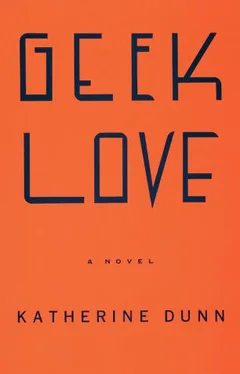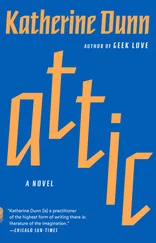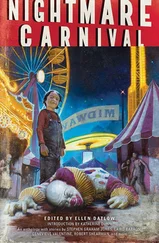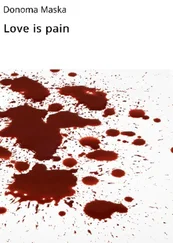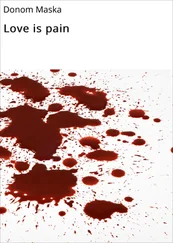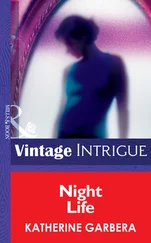I hopped off into the dust and Doc P. stepped onto the platform. I tried to look up her white uniform skirt as she went up. I couldn’t see past the murk at her knees. Her voice started before the platform stopped.
“Arturo, it’s crucial that you reconsider this totally inefficient method! Do you know how many individual digits I did today? Forty-seven!”
I went off for a stroll. There was a clear division between the Fabulon camp and the followers. The show rigs were all tight, tidy, and workable. The followers had strange outfits: pup tents, pickups with campers, tiny trailers that folded out into tents on wheels, several station wagons with bedding and bandages in back, decrepit cars, a converted ice-cream wagon, a bread truck, a pair of ancient Harley-Davidson motorcycles with sidecars. One of the sidecars was shaped like a wooden shoe and the other like a submarine. They belonged to a pair of hard-nosed old thugs, who slept in their sidecars and insisted on having the tattooed skin peeled off their arms and legs as they were removed. They tanned the tattoos and kept them in scrapbooks in their saddlebags. Arty said privately that they would never have joined if they hadn’t been old and afflicted with the chickenshits about riding hard in big groups. They stuck together and helped each other, scaring off the fawning novices who wanted to suck up to them. Arty was bitter because they were more loyal to each other than to him and because they’d spent a wad on having their cycles converted to tongue-and-jaw controls before they showed up asking for salvation. He was suspicious of them for thinking that far ahead.
I was leaning on a dusty car listening to the soft song from the hospital trailers when the door of the infirmary opened and Norval Sanderson stepped down with a bundle wrapped in a plastic garbage bag. He closed the door behind him and was sauntering coolly away when Horst appeared from behind another van. The big cat man’s eyes squinted as he saw Sanderson. “Well, I swan there, Norval,” hollered Horst. Sanderson eased to a halt and turned graciously. “Looks,” said Horst in a companionable tone, “like you’ve got yourself a tidy-sized chunk of something!”
“Horst, my fine fellow!” cried Sanderson, his fastidiously creased shirt and trousers emphasizing the delicate demonstration of pleased surprise. “I was just thinking of looking you up for a soothing session over the checkerboard!” Sanderson lifted a pint bottle of bourbon from a rear pocket and offered it. Horst walked all the way around Sanderson slowly, eyeing the plastic-wrapped bundle. Then he stopped beside the reporter and took the bottle. Sanderson was calm and genial.
“Checkers, hunh?” said Horst, unscrewing the cap.
“Outdoors, perhaps,” said Sanderson, “where I can sit upwind of you.”
Horst slanted a blue glance at Sanderson and tilted the bottle to his lips. “Aah,” he sighed, and handed the bottle back. “Now it seems to me that there’s some question as to who sits upwind.” Sanderson tipped the bottle, courteously neglecting to wipe the neck on his sleeve. “By my thinking,” mused Horst, “a poacher outstinks a cat man any day, and if you’ve got anything less than a whole thigh in that bundle, I’m a pig’s ass.”
Sanderson raised his eyebrows in mock surprise above the angled bottle. He swallowed and looked solemnly over Horst’s lanky frame.
“It is an offense, sir,” said Sanderson, “to justice, to reason, and to the tender female who brought you forth and nurtured you to your present stature, to even consider that you might bear any resemblance to a porcine posterior.” Sanderson nodded gravely at the bottle, shifted the bundle under his arm and took another swig.
“That’s my opinion,” said Horst. “But look here, I thought we had an understanding that you could make do with the bony bits. You get all the fingers and toes anyway.”
Sanderson’s shoulders lifted in helpless resignation. “You have me at a loss. What can I say? Laziness, my dear Horst, will be my downfall.”
They strolled out of earshot as Sanderson handed Horst the bottle and the bundle. Horst tucked one under his arm and the other against his teeth as they disappeared behind a van.
This was their standing argument. Horst wanted the big chunks for his cats. Sanderson had promised to leave the arms and legs and be content with hands and feet, which were more plentiful anyway. Sanderson hung the bits up on the outside of his van for his maggot crop. It was, he claimed, easier to whack a big chunk onto a single hook than to painstakingly string up a shish kebab of small pieces. Horst would carefully explain that hands and feet were useless to him. “Nothing’s surer than my cats would choke on all those little bones. But they’ll collect worms just fine.”
Sanderson countered with mild reminiscences of domestic cats stripping fish spines.
• • •
Sitting in the dark next to our van on a summer night with the midway roar muted a little way off, Mama was almost invisible in her folding chair. Her hair caught the glow and sometimes a scratch of light hit her long legs as she shifted, folding one leg over the other. It was the after-supper lull, with the chores done and the last shows of the night causing the big tents to glow and billow with the crowd’s breath.
I had ushered in Arty’s crowd, collected the tickets from the booth, and could sit, waiting for the tent walls to spangle in the rainbow finale of Arty’s act. That was my cue to run for the stage exit and help him out of the tank. Mama, after all her years as duenna to the twins’ act, had semi-retired. The redheads helped the twins with costumes. Jonathan Tomaini supervised the props. Mama sat outdoors in good weather, crossing and recrossing her legs.
Beside Mama, in my own folding chair, with my feet sticking straight out in front of me, I thought about my innards. Just a few months before I’d had no idea whether my reproductive equipment worked. There was no evidence. But that week I had become a full-fledged bleeder and was still absorbed by this first change in myself that I had ever noticed. The click and buzz of my synapses kept making the same connection. If you can change, you can also end. Death had always been a theory to me. Now I knew. The terror hurt good and I nursed it and played it like a loose tooth.
“No mosquitoes,” murmured Mama. “A blessing.”
“A creep!” The shout was from Elly somewhere in the dark.
“Creep! Creep! Creep!”
“Please, just leave us alone,” pleaded Iphy. “We’re quite all right alone.”
“Stay away from us! Don’t follow us! Don’t wait for us! We don’t need your help and we don’t want it!” The twins came fast around the end of the van and headed for the low deck that joined the three Binewski units. Behind them, shuffling steadily, wheezing and gurgling, came the stooped figure of the Bag Man.
“Mama, tell him to leave us alone!” The twins swooped past us to their door. The light spilled out of their trailer in a wedge and then disappeared as they slammed inside. The Bag Man’s big shadow stopped in front of Mama, hauling in noisy wet air and bobbing in place. The veiled head bent toward the twins’ van.
Mama tipped back to look up at the dim hulk. Her hand slipped out to touch my arm. “Does he understand English?” she whispered. I grunted and she leaned back. Her silver-cloud head nodding slowly in the murk. The Bag Man took in a bale of air and let it out in what might have been a sigh. He lurched over to the deck and sat down with a grunt. He looked ready for a long wait.
Beyond the dark backs of the booths the Ferris wheel started turning. Its flashing bulbs threw a pulse of light over Mama’s face. She stared at the wheel.
“That Bag Man,” she murmured. “He seems so familiar. I’ll remember soon.”
Читать дальше
